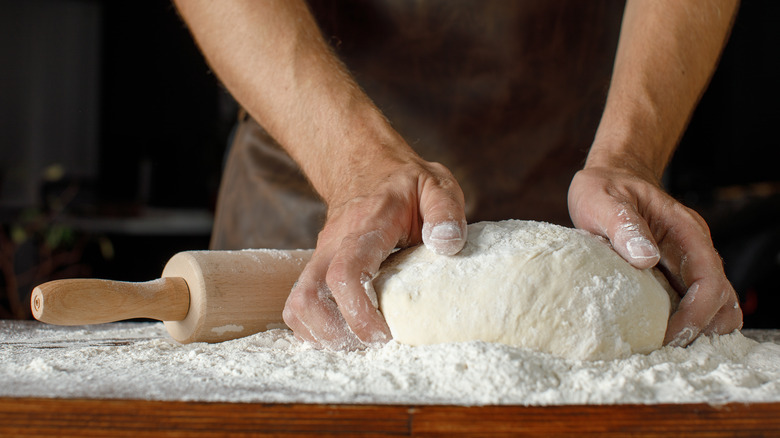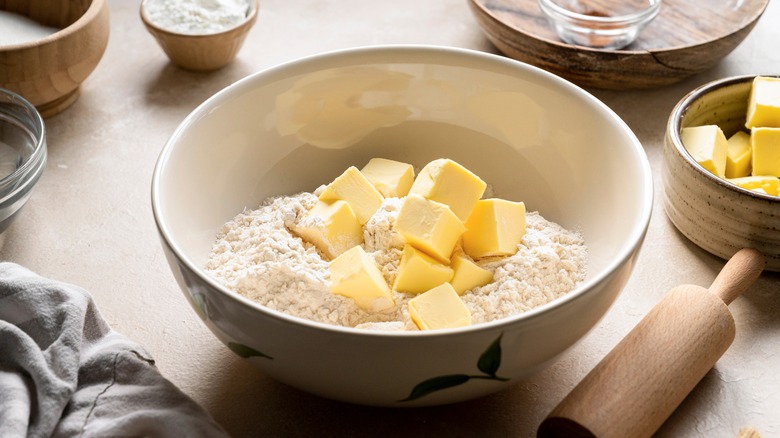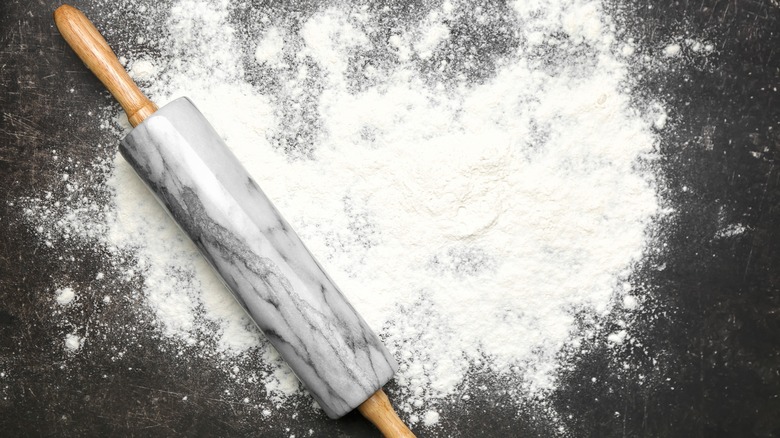Freeze Your Rolling Pin For Superior Pastry Dough
Whether you enjoy whipping up a batch of classic butter croissants or chocolate- and hazelnut-filled Nutella éclairs, there's an undeniable art to making pastry dough. You have to start with the proper blend of ingredients, of course, carefully measuring them out and mixing them all together. Then comes the kneading, which is crucial for distributing the ingredients and achieving just the right balance of structure and elasticity.
Of course, keeping your dough cool is equally if not more important in terms of texture and structure. Doing so gives the gluten contained in the mixture time to relax, which makes it much easier to roll out and helps to prevent shrinkage while in the oven, too. For this reason, placing your dough in the refrigerator before rolling it out is essential. Although some recipes may recommend cooling your dough in the refrigerator for upwards of three hours– sometimes even as long as overnight – 30 minutes can easily suffice, especially if you opt for the simple trick of freezing your rolling pin before tackling your dough to ensure your fats don't melt.
Cold rolling pins also prevent the butter from melting
Although some dessert recipes like cookies and various cakes call for softened butter, the role of the cold chunks of fat in the pastry dough-making process cannot be underscored — at least when it comes to baking the most scrumptious pastries. In a nutshell, the fat helps the dough retain its shape thanks to the steam released by the butter as it bakes, which helps to lift the dough and provide it with a fluffy volume.
Along with its shape, rolling the butter out into the dough is what gives pastries like pies and biscuits their signature crispy, golden layers. As you roll out your butter, you essentially spread the fat out into long, thin sheets, which lay between the mixture of flour and water, creating the flaky layers. However, if you let the butter melt before your doughy creation can make it into the oven, it will only tenderize your flour, making your finished product extra dense and chewy.
As a result, keeping the butter cool throughout the entire preparation process — including while rolling — is important. This is where an icy-cold rolling pin comes in handy. All you have to do is pop your rolling pin into the freezer for about 10 to 15 minutes, and then you're ready to roll out your dough without the worry of your butter melting as you go.
The best type of rolling pin to freeze
Before you pull out your favorite rolling pin, it's important to note that not all rolling pins are created equal. And, apparently, the proof is in the pastry. Although wooden rolling pins are often favored because they're lightweight and durable, it seems that marble and stainless steel rolling pins may have a leg up on their wooden counterparts after all, specifically when it comes to rolling out the buttered pastry dough.
Granted, the metal and stainless steel options are undoubtedly heavier, which can make rolling out dough more difficult. However, this does depend heavily on the user's preference because, on the contrary, not as much effort will be required in terms of applying pressure to the dough.
But, in addition to being smoother than the wooden variety, marble and stainless steel rolling pins are also naturally cooler to the touch. Meaning, they can also be easily chilled in the fridge or freezer, making them perfect for working with buttery dough.



